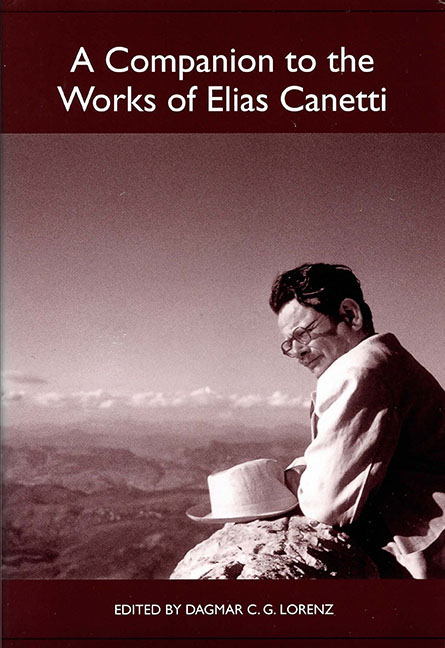Book contents
- Frontmatter
- Dedication
- Contents
- Canetti's Principal Works
- Abbreviations of Works Frequently Cited
- Introduction
- Canetti's Global Significance
- Writing and Language
- The Works: Themes and Genres
- “The Faultiest Expressions Have the Greatest Attraction”: Elias Canetti's Proverbial Aphorisms
- Canetti's Aufzeichnungen
- Staging a Critique of Modernism: Elias Canetti's Plays
- “Gute Reisende sind herzlos”: Canetti in Marrakesh
- Space in Elias Canetti's Autobiographical Trilogy
- Philosophy and Social Thought
- Historical Contexts
- Works Cited
- Notes on the Contributors
- Index
Canetti's Aufzeichnungen
from The Works: Themes and Genres
Published online by Cambridge University Press: 28 April 2017
- Frontmatter
- Dedication
- Contents
- Canetti's Principal Works
- Abbreviations of Works Frequently Cited
- Introduction
- Canetti's Global Significance
- Writing and Language
- The Works: Themes and Genres
- “The Faultiest Expressions Have the Greatest Attraction”: Elias Canetti's Proverbial Aphorisms
- Canetti's Aufzeichnungen
- Staging a Critique of Modernism: Elias Canetti's Plays
- “Gute Reisende sind herzlos”: Canetti in Marrakesh
- Space in Elias Canetti's Autobiographical Trilogy
- Philosophy and Social Thought
- Historical Contexts
- Works Cited
- Notes on the Contributors
- Index
Summary
Elias Canetti'sAufzeichnungen, or notebooks, accompany his work over more than fifty years and provide a comprehensive overview of his thought about the masses, the isolation of the individual, power, the fear of global destruction, survival and death, the traditions of literature and philosophy, myths and mythology, language, and the problems of satire, as well as comments on his own writings. Whatever Canetti tried in his other books reappears in the Aufzeichnungen.
The wide intellectual range of the Aufzeichnungen is surely one of the reasons why they have been neglected in Canetti scholarship. Although they are often cited as interesting self-interpretations on the part of the author or as providing parallels to his systematic studies of major problems, there are few studies focusing on the Aufzeichnungen as such. Even valuable introductions into the work and thought of Canetti, such as Dagmar Barnouw's,pay much more attention to the novel, the plays, the autobiography, and to Masse und Macht than to the Aufzeichnungen. The task at hand, then, is an account of the writing contained in the notebooks, a study of their structure (or lack of it), and, finally, observations on some of their formal and stylistic particularities, rather than an analysis of Canetti's thought.
I shall begin with two general remarks. The first is an exclusion: Eric Leroy DuCardonnay advances strong arguments for an inclusion of Die Stimmen von Marrakesch (1967) in a study of Canetti's notes, among them the subtitle Aufzeichnungen nach einer Reise. The predominantly narrative character of the chapters in this book, however, provides an equally strong argument for its exclusion from such a study. Die Stimmen von Marrakesch is closer to the autobiographical books, which it precedes by nearly ten years, than to the Aufzeichnungen. Canetti's publisher seems to have been of the same opinion. The Hanser edition of Canetti's complete works prints Die Stimmen von Marrakesch as well as Der Ohrenzeuge (1974) separately from the Aufzeichnungen. Second, I shall avoid discussing the problem of genre. Thomas Lappe, taking as a point of departure a study of Canetti's notes, has tried to establish a particular genre, the Aufzeichnung, in twentieth-century literature, particularly German literature. I am skeptical that this is a useful expansion of the categories used in genre discussion, all the more so because any definition of genre tends to become normative and is therefore rarely helpful.
- Type
- Chapter
- Information
- A Companion to the Works of Elias Canetti , pp. 123 - 136Publisher: Boydell & BrewerPrint publication year: 2004

